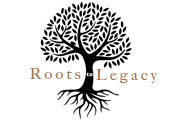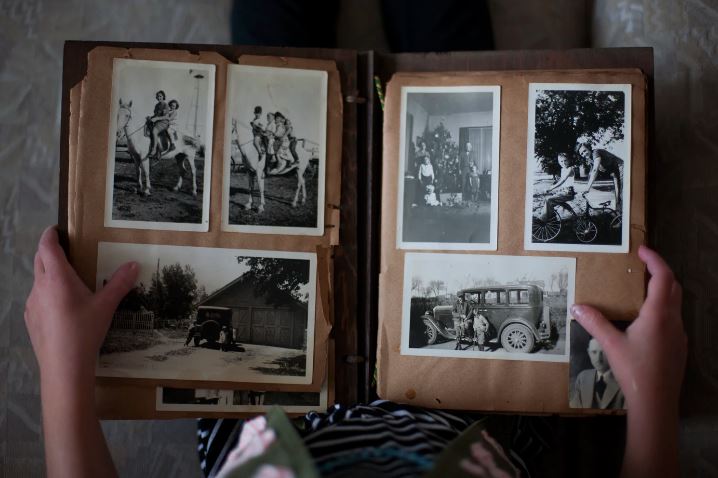We are all shaped by the backgrounds, experiences, choices, and qualities of those who brought us into this world. These ancestral aspects contribute to our early, and eventual late, life experiences more than anything else. There are of course other influences on our lives such as teachers, neighbors, friends, churches, coaches, etc. but none of these come close to the level of influence our family heritage has on our personal development and life experience. Even when these other external influences may have the ability to change trajectories and shape beliefs and actions, they often don’t have much effect in the larger scheme of things because those influences themselves have been shaped and determined by our family heritage. For example, someone who comes from a certain family background will have external influences that are aligned to the background of that family. If you come from a heritage that values education, you are more likely to have external influences that share those values, beliefs, and actions. Therefore, you will have better teachers, more positive educational influences in your neighborhood, friends who value education, and so forth. There is no greater effect on what you will believe, the choices you will make, who you will become, and the opportunities you will have and take advantage of than your family heritage.
This of course does not mean that you have no power over who you will become. To the contrary, I believe you have great ability to shape yourself into the person you want to be and have the life experience you want to have. This being said, your family heritage can pose great advantage or great disadvantage on your efforts to become the person you want to be. I believe that those advantages can be wasted, just as those disadvantages can be greatly overcome.
The ways in which your family heritage shape you are innumerable. Your family background shapes you in every way imaginable, including areas such as financial, emotional, educational, cognitive abilities, decision making, risk taking or aversion levels, political and other attitudes, locus of control orientation, relational, creativity, dedication, judgement, physical health, mental health, etc. The list goes on and on. The effect your family heritage has on you cannot be understated. It is the most influential aspect of everyone’s life.
Since this familial influence is so fundamental and powerful, it puzzles me that greater emphasis is not placed on it by society. We are all aware of the many social and other problems that exist in the world, but it seems like the proposed and enacted solutions for these problems are based on external factors and don’t seem to consider the possibility of focusing on addressing the familial heritage based causes of so many problems individuals and society experiences. If we know that familial heritage has such a great effect on individuals, and ultimately society, for good or bad, it only makes sense that we all should be encouraged to use this knowledge to learn from the past, elevate ourselves, and improve the world.
This is where intergenerational analysis comes in. Intergenerational Analysis is a concept I’ve long valued, but was recently introduced to as a defined concept through the work of Greg McKeown. Greg is a world renowned speaker, business consultant CEO, and author of the best selling book, “Essentialism”. When I heard Greg McKeown define the concept of Intergenerational Analysis, I was inspired to further study and apply the concept in my life. To learn more about Greg McKeown and his work you can visit his site at https://gregmckeown.com/ .
To me, intergenerational analysis is the act of analyzing our family heritage to understand the things that have shaped us so we can use that knowledge to magnify the positive aspects of our heritage and filter out the negative aspects so we can strategically build the life and legacy we want.
Intergenerational analysis is the act of analyzing our family heritage to understand the things that have shaped us so we can use that knowledge to magnify the positive aspects of our heritage and filter out the negative aspects so we can strategically build the life and legacy we want.
Often traits, beliefs, abilities, and actions are passed down through generations. It’s only natural that the things you are exposed to most influence the way you see and navigate the world. This is a principle by which the world functions. For those lucky enough to have positive traits, beliefs, and examples passed down to them, this principle is a great blessing to them and can provide great advantages to them in the world. For those who have negative traits, beliefs, and examples passed down to them, this principle can be a great obstacle and can limit their capacity to obtain their best life.
In both cases, positive or negative, one’s ability to create the life they want is not determined solely by the circumstances that defined their upbringing and family heritage. It is a major factor, and one that cannot be understated, but there is no guarantee that the legacy you have been given is the legacy you will perpetuate and leave. You choose to perpetuate the legacy you have been given, either by deliberate choice or by passive default. If you take no thought of the legacy you have been given and whether or not you want to adopt it or change it, there is a very good chance the legacy you leave will be diminished from the one you received.
…one’s ability to create the life they want is not determined solely by the circumstances that defined their upbringing and family heritage.
This is why intergenerational analysis is so important. Without thought, analysis, and action, there may be no progress, and perhaps there may even be decline. Negative traits emerge much more easily than positive ones. Without conscious analysis and effort, negative traits will most likely be perpetuated and a declining cycle of negative traits will emerge.
It is important to remember that no one family only has either positive or negative family heritage qualities. Every family line has some of both. Perhaps some have more positive than negative, or vice versa, but every family will have some instances of positive and negative qualities. Your goal should be to understand the positive so you can use, magnify, and improve upon them, and to understand the negative so you can see potential blind spots, avoid detrimental beliefs and choices, and weed the negative traits out of your family heritage going forward. Doing this, both improving upon the positive and eliminating the negative, is very difficult. These are traits that may have been ingrained in your family for generations. Learning from the past to improve the future is no easy task, but the rewards can be invaluable.
There is also no set definition of what a negative or positive quality might be. It is up for you to decide if a quality is positive or negative. This can be determined by your personal values and goals. In general, some qualities can be seen as positive or negative to most people, but it is possible that a positive quality to one person, could be a negative to another. It comes down to the life and legacy you want to create. I hope that in any case, you have a goal to make the world a better place and that you create a legacy that does so.
A word of caution. Conducting an intergenerational analysis can be a very emotional and difficult process for some. There may be traumatic experiences you’ve had or difficult things in your past that have been shaped by your family heritage which are painful to confront and expose yourself to. This process can open wounds that perhaps you didn’t even know you had. I encourage you to tread lightly if needed. Don’t just jump into the deep stuff if you are not ready to do so. You can focus on the safe stuff first and still get great benefit from it. I also encourage you to work into the deep waters eventually. This may necessitate the help of a licensed professional who can help you walk that path safely. The goal is to create the legacy you want and not to be forever shackled by the legacy you were given. If there are difficult things to work through, work through them eventually. Don’t keep the difficult things buried forever like the ones before you may have done. Be the one that changes your family’s legacy for the better, forever.
How to Perform an Intergenerational Analysis
When conducting an intergenerational analysis, it is essential to analyze your positive and negative family heritage traits separately. Analyze one and then the other. You need to really focus on each individually. If you try to analyze both things may get convoluted and you may miss important details.
It is also helpful to break your analysis into different areas. For example, you may want to approach your analysis by looking for qualities related to finances, marriage relationships, parenting styles, education, problem solving abilities, career, home life, curiosity, risk taking, worldview, home organization, lifestyle, health, etc. Make a list of all the areas you want to analyze. Perhaps choose two or three to begin your analysis. As you conduct your analysis ideas for other areas will emerge. Add those areas to your list so you don’t forget them. Remember, you are conducting this analysis so you can glean the principles, beliefs, traits, and actions that have shaped your family heritage. Think about the life you want and the areas of your life and legacy you want to improve. These are the areas you should analyze. The more areas the better.
Finding the Data
An intergenerational analysis can be conducted on your family heritage as far back as you have information about the lives of your ancestors. If you have a life story written by your great great grandparents, then use that to learn about their lives and glean what qualities, beliefs, and actions they had. You can then work down the generations until you get to your parents. You should try to conduct your analysis on at least your grandparents and parents, but go as far back as you have information on. If you don’t have written histories on your ancestors, or if you didn’t know them personally, or know many of their stories, ask people who do know. Talk to your grandparents and ask them what they know about their grandparents or parents. Ask questions that will reveal as much information as possible about the aspects of their lives you are wanting to analyze. Be tactful and let them know you are just trying to learn from your heritage as you chart out the path you are blazing for yourself and your children. Surprisingly, most people haven’t had intimate discussions with their parents or grandparents about their lives. Having these conversations not only help you better understand them and your family heritage qualities, but it helps you also connect with your loved ones who are still with you.
If you don’t have access to people who knew your ancestors, or if you don’t know much about them from their personal journals, etc. You can do some family history research to find out as much about then as possible. There are online resources such as Ancestry.com, familysearch.org, or myheritage.com. These resources may contain details about your ancestors’ lives you never knew before. You can also hire a genealogist to do the research for you. These professionals are highly skilled at finding out as much about your ancestors as possible. You would be surprised at the wealth of knowledge they may be able to provide you.
Conducting the Ancestor Analysis
Once you have information about your ancestors, study their lives. Take each one individually and learn their story as best you can. Try to get to know them in general. Study where they grew up, what their general life experience was, the opportunities they had or lacked, and what kind of life they had. Look for obstacles they faced and how they handled them. Research the eras in history they lived and what the world was like during that time. Get specific and research what life was like for people that lived in the places they did at the time they did. Become as familiar with them as possible. The more you feel like you know them, the better you will be able to understand the details of their life you are going to analyze. Look for general patterns you see in the lives of your ancestors from one generation to the next. Notice any general themes that emerge in this process. Take notes of any thoughts or insights you have.
Next, get more specific. Choose an area you want to focus on such as Health. Start on a generation as far back as possible. Select the ancestor’s life to analyze and review what you know about that person as it relates to the area you are focusing on. Write everything you know about the health of that person. What was their health like? Why? How did their health affect the other areas of their lives? Etc. Ask all the questions you can and find as many answers as you can. Once you have exhausted all the information you have on that ancestor related to that area, move on to another area you want to focus on and do the same. Stay on that ancestor until you have gone through all the questions and answers you can for the areas you want to focus on. Once that ancestor’s life has been fully analyzed, move on to their spouse, and then their child, until you get to your parent for that family line. As you work through a family line, again, look for patterns and themes that emerge. Ask questions about how one generation may have affected or been affected by the others. Once you have completed this level of analysis on all of your family lines you will have the information you need to then analyze how what you have learned can help you shape your own life and legacy.
Conducting the Intergenerational Analysis on Your Life
Let’s look at how to analyze both positive and negative family heritage qualities, to help you shape the legacy we want to build.
Positive Family Heritage Qualities Analysis:
List out the positive family heritage qualities that emerged during your ancestor analysis. If there is any quality, trait, belief system, or action that you learned from your ancestors’ lives that could help you shape the life you want, write it down. Make a list of every positive quality you want to perpetuate, develop, or improve on and note your initial thoughts on how you might be able to do that. Ask questions such as, How can I further develop and perpetuate this quality? How was my ancestor able to develop that quality? Why did that type of thinking help that ancestor become who she was? You can’t ask too many questions here. You want to arrive at a place where you know the positive qualities that have shaped your family heritage and that you want to further perpetuate.
Negative Family Heritage Qualities Analysis:
Conduct the negative family heritage qualities analysis the same way you conducted the positive qualities analysis. The only difference is, this time you are looking for any quality, trait, belief system, or action that you learned from your ancestors’ lives that you want to avoid or improve upon.
When analyzing the negative qualities, it’s important to remember it’s not about judgement. You are not doing this to condemn or belittle your ancestors, you are doing this to learn from them. They are offering you a gift to be able to look back on their lives and learn from their mistakes. Going back to judge them won’t improve your life, only making positive changes in your own life will. This analysis should be undertaken with love.
Use the lists you have developed about the positive and negative qualities to form a personal set of goals and strategies to follow and implement to create the life you want. Make a plan on how to use this knowledge you have gained to create a legacy improved upon the one you were given. Keep these lists visible so they stay on your mind and in your focus. Review them often and measure the progress you have made on the goals they informed.
Conducting an intergenerational analysis should not be a one-time thing. It should be done frequently. Depending on how far you go back and how much information you have to analyze, this can be a time consuming venture. Don’t expect to do it all in one hour. You should return to the information often and reanalyze things. Over time your perspective and insights may change. There may be things there in your ancestors’ lives that you previously missed. Set aside time at least a couple times a year to revisit and renew your intergenerational analysis. Stay on top of the goals it inspired and adjust them as necessary over time. Remember, the legacy you were given does not have to be the legacy you leave. It is up to you to do what is necessary to perpetuate the positive and improve upon the negative. You are not captive to the family heritage you were given.





